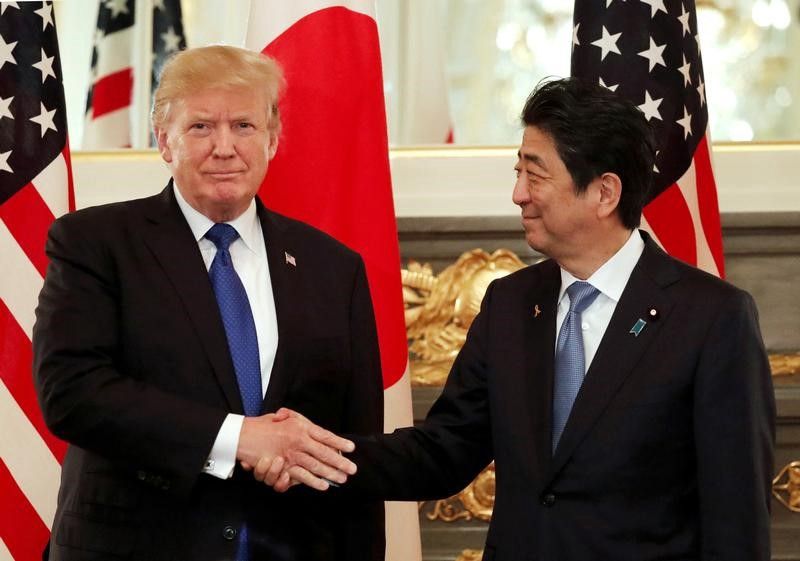April 17, 2018
Today, Japanese Prime Minister Shinzo Abe heads to Mar-a-Lago for a meeting with Donald Trump. The chance to commiserate over their shared love of golf and koi fishcouldn’t come at a better time. Trump is reeling from an investigation of his personal lawyer and bracing himself for a battering of a book release, while Abe is embroiled in a corruption scandal that has sent his poll numbers tumbling to record lows. But relations between the US and Japan have been testy lately, and Trump’s distrust of America’s closest Asian ally goes back decades.
As Abe touches down in Florida, my fellow Signalista Gabe Lipton (@gflipton) sees three areas to watch:
Tariffs: Japan is the only major US ally that didn’t win an exemption to the Trump administration’s new steel and aluminum tariffs. The White House wants to use that as leverage to reduce the trade deficit between the two countries ($55 billion in Japan’s favor in 2016). So long as Abe can present concessions — for example, on autos or currency manipulation — that allows The Donald a “Tweetable” win, this is the area where we’re most likely to see some progress.
Trade Deals: President Trump pulled out of the Transpacific Partnership (TPP) in his first days in office, dealing a blow to Japan both economically (about 2.5 percent of GDP by 2030) and politically — Abe had stuck his neck out in order to reach a domestically unpopular deal that Trump then blew up. When it comes to trade deals, the two countries simply aren’t aligned: Japan wants the US back in TPP, while Trump seeks a bilateral free trade agreement that gives Washington more leverage. So while both sides will try to pitch deeper economic cooperation, they have different visions of what that means.
North Korea: The most important issue for the Japanese prime minister will be making sure his voice is heard in any diplomacy between the US and North Korea. So far, the Trump administration has largely shut Japan out of its overtures to Pyongyang. A nightmare scenario for Abe would be a US-North Korea agreement that rids Kim of the long-range missiles that can hit the US, while allowing him to keep short and medium-range weapons that threaten Japan.
Deadly Sand Traps: On the other hand, high politics aside, not falling into a sand-trap would also be a basic win for Prime Minister Abe this time around.
More For You
- YouTube
At the 62nd Munich Security Conference in Munich, GZERO’s Tony Maciulis spoke with Benedikt Franke, Vice Chairman and CEO of the Munich Security Conference, to discuss whether the post-1945 global order is under strain or already unraveling.
Most Popular
- YouTube
Zelensky agrees: elections matter #PUPPETREGIME
As more small businesses move sales, payments, and customer relationships online, they unlock new opportunities, but they also become easier targets for cyber-criminals and other threat actors.
TOKYO, JAPAN - FEBRUARY 8: Japan's Prime Minister Sanae Takaichi, leader of the ruling Liberal Democratic Party (LDP), places a red paper rose on the name of an elected candidate at the LDP headquarters on general election day on February 08, 2026 in Tokyo, Japan. Voters across the country headed to polls today as Japan's Lower House election was held.
Photo by Kim Kyung-Hoon - Pool/Getty Images
When Japanese Prime Minister Sanae Takaichi called snap elections last month, it was a big gamble. Holding a winter election just four months into her tenure with no real policy record to run on?
© 2025 GZERO Media. All Rights Reserved | A Eurasia Group media company.
